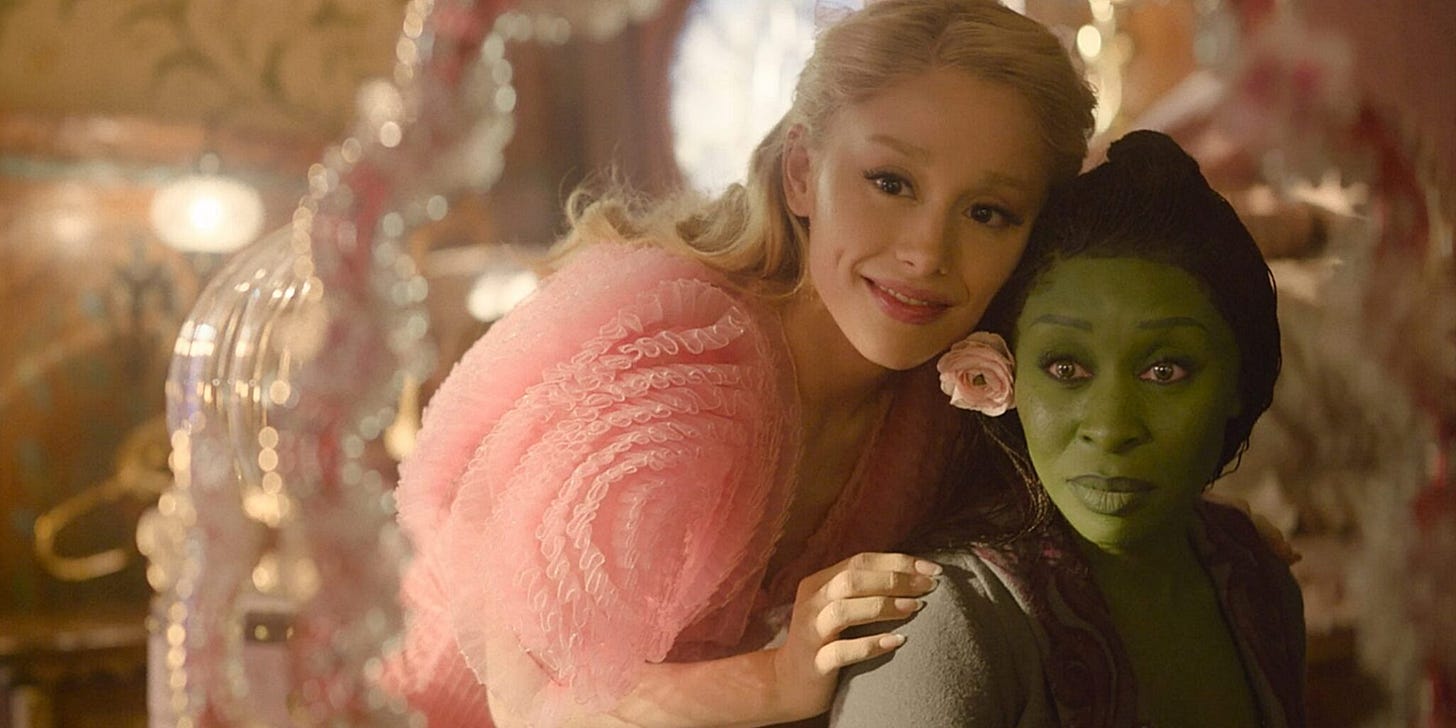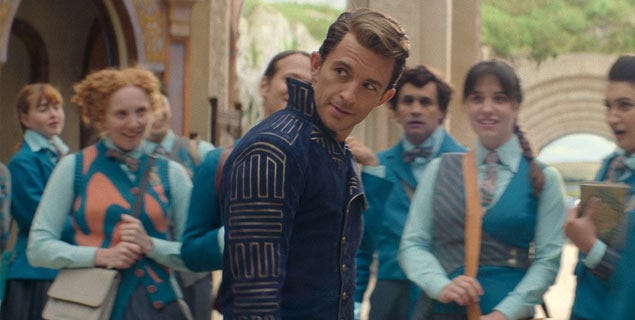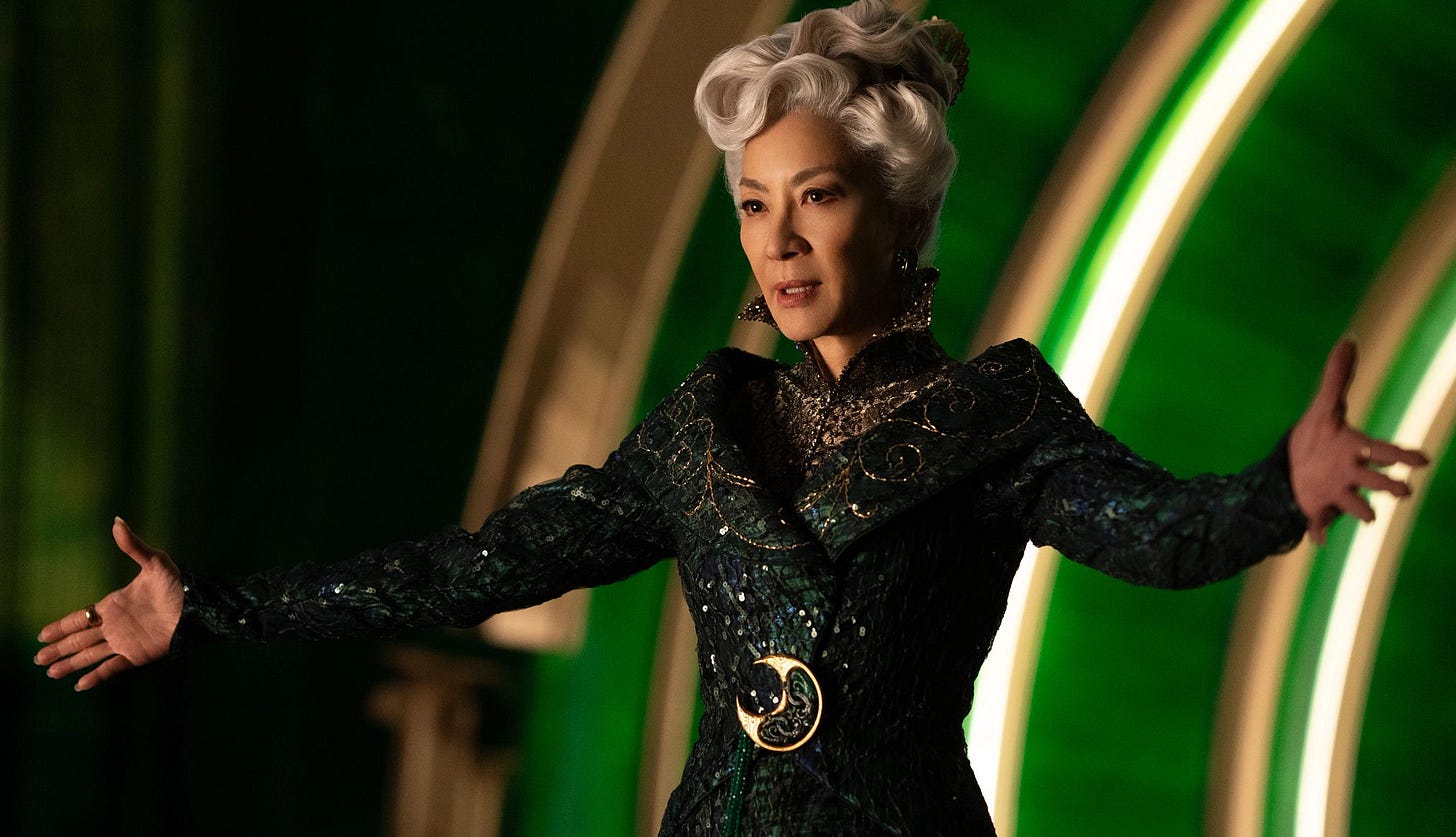Glinda (Ariana Grande) and Elphaba (Cynthia Erivo) share a deepening friendship
Wicked (2024)
In theaters
This may be the oddest movie musical I’ve seen. It’s based on the Broadway show (now 19 years into its run; amplified by American and worldwide road companies), and the filmmakers have announced that this is Part 1 of their adaptation.
Part 2 will arrive in November 2025. Part 1 is even longer than the stage version yet tells only half the story.
But that expanded narrative didn’t bother me in the least. A prequel to The Wizard of Oz set before Dorothy’s arrival, its story from a novel by Greory Maguire eases on down its 2-hour, 40-minute road. It introduces its songs catchily, and the action swarms and buzzes.
What surprised me was how the script fills up its extended length by tracing the ardor of not one but two heroines.
In The Land of Oz at Shiz University, a bastion for gifted potential magicians, Glinda (Ariana Grande) is a rich doe-eyed blonde feverishly angling to receive instruction from the school’s Dean of Sorcery, Madame Morrible (Michelle Yeoh).
Elphaba (Cynthia Erivo) as the story gets underway has stopped by the university on opening day merely to see that her wheelchair-bound sister Nessarose (Marissa Bode) is comfortably enrolled.
Elphaba’s skin is green, and when she shyly steps onto campus, students recoil. Mournfully dressed in black, peering through spiral eyeglasses in a constant, jittery stare, she’s a sight the students both revile and also can’t help laughing at.
As if for the millionth time, she coolly announces that she doesn’t know why she’s green. Besides, in case they were wondering, she isn’t remotely interested in studying magic with them.
But when with an unintended angry flick of her eyes she inadvertently reveals a prowess in magic, a fascinated Madame Morrible pounces. This strange, shy young woman has great witch potential, and the professor immediately invites her to become her most favored student.
Which is precisely the spot Glinda covets. When Morrible makes them roommates, the ambitious rich girl welcomes the chance to keep her dour, robed-in-black rival close, the better to study and get a leg up on her.
The lush, richly orchestrated musical numbers, lavish sets and exquisitely detailed costumes lift this familiar “girl power” narrative onto an emotional plane I found surprisingly affecting.
Erivo soars above the story’s enchantment to convey a yearning beyond the skin color of Elphaba or the actress epitomizing her. Both are in play.
The loopy students — the script frees us to imagine that all magicians are a little bit nuts — spring into fervent song and dance in “Dear Old Shiz”, as Glinda makes clear she’s the coolest kid on campus.
Grande nails her specialty number, “Popular”, showing Elphaba that there’s wizardry and wit in beauty and social élan, areas she’s more expert in than Morrible.
But in “The Wizard and I”, the professor of witchcraft takes Elphaba firmly under her wing and exerts a power her new prodigy can’t resist.
The women of Oz fall to swooning over the dashing Prince Fiyero (Jonathan Bailey)
Complete bliss, however, eludes both these strong-willed young women when the roguish, handsome Prince Fiyero (Jonathan Bailey) casts dreamy eyes on them. He dazzles all of Oz with his rakish charm and Bailey sings and dances with the entitled ease of a dish whose lifted eyebrow sends women into a tizzy.
The spectacularly staged and choreographed “Dancing Through Life” shows us Fiyero as duke in his domain. When he courts Glinda, with seductive side glances at Elphaba, the three-way romance stays sweetly chaste yet hits the heart, stunningly in Elphaba’s lament, “I’m Not That Girl”.
But nothing will do but for these two intrepid females to meet the Wizard (Jeff Goldblum), and once they arrive in Oz’ capital, The Emerald City, they inevitably have to work out between them whose powers will prevail.
Morrible, who’s followed her two students to the capital, joins forces with the Wizard to bend all Oz to their will, with freedoms curtailed, and ultimate magical power reserved only to this clearly diabolical pair.
The struggle plays out in a hair-raising climax, when Elphaba, not yet “The Wicked Witch”, summons powers even the malign Wizard and Morrible can’t override. She soars above them and sets up the contest that will surely test her and Glinda in Part 2.
It will be worth the wait. The performances here are all strong enough to leave us with questions about these hungry seekers after — what, exactly? Where will all their prowess in magic leave them?
Michelle Yeoh’s implacable Madame Morrible doesn’t like taking no for an answer
Michelle Yeoh makes a commanding Madame Morrible, and she speaks her lines with a compelling blend of the delightful and the sinister. Goldblum seems more himself than an embodiment of the flimflamming Wizard, but he has a presence and edge that could get to the core of this slippery con man in Part 2.
The two young women at odds who become deeply attached to one another keep us guessing. Grande has a pixie-like charm that can turn steely and tough in an instant, the airhead who’s actually got a head on her shoulders. She’ll remain a formidable force.
Cynthia Erivo rises to the very peak of the movie’s wish to enchant. Actually, she goes higher and hovers just above it. Erivo’s more than a powerful singer and a subtle, surprisingly tender actress.
She does what only the greatest musical performers can — enlarge a character through song.
Her voice doesn’t just situate and plead for Elphaba in her predicament. Her singing calls forth a dignity and backbone that the script, for all its tone of uplift, doesn’t wholly express.
I quite enjoyed the wide-ranging spectacle director Jon M. Chu keeps in motion. It’s all richly set off by Paul Tazewell’s super-odd yet buoyant costumes, frilled to the max.
But I kept wanting the movie’s grand gestures to step up a level alongside Erivo’s greatness.
She soars above the story’s enchantment to convey a yearning beyond the skin color of Elphaba or the actress epitomizing her. Both are in play. The actress lifts the material to an eloquence, a yearning to beat back sorrow, that the fairytale plot isn’t actually equipped to come to terms with.
Without betraying the text, Erivo transcends it. There’s nothing magical about her fine, austere work. She’s got an artist’s touch, the gift to propose, in performance, that you can be more than anyone takes you for. Not by defying gravity but by holding your head up.
Though that wasn’t a song in the musical’s score, thanks to Erivo it’s the tune I was humming as I left the theater.







"eases on down the road" -- I see you